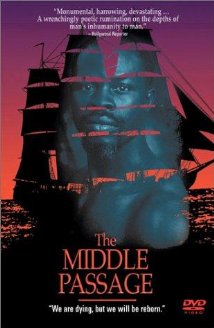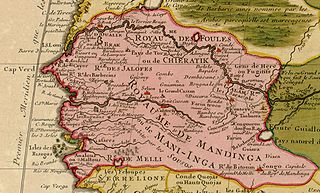
The history of Senegal is commonly divided into a number of periods, encompassing the prehistoric era, the precolonial period, colonialism, and the contemporary era.
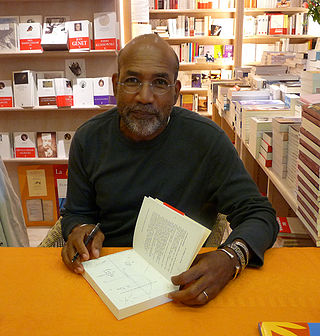
Patrick Chamoiseau is a French author from Martinique known for his work in the créolité movement. His work spans a variety of forms and genres, including novels, essays, children's books, screenplays, theatre and comics. His novel Texaco was awarded the Prix Goncourt in 1992.

Alain Tanner was a Swiss film director.

Adolphe Sylvestre Félix Éboué was a French colonial administrator and early adherent to the Free French Movement. He was the first black French man appointed to a high post in the French colonies, when appointed as Governor of Guadeloupe in 1936.

Édouard Glissant was a Martinican writer, poet, philosopher, and literary critic. He is an influential figure in Caribbean thought and cultural commentary and Francophone literature.
The Franco-Trarzan War of 1825 was a conflict between the forces of the new emir of Trarza, Muhammad al Habib, and France, ruled at the time by Charles X and the ultra comte de Villèle. In 1825, Muhammad attempted to establish control over the French-protected Waalo Kingdom, then located south of the Senegal River, by marrying the heiress to the kingdom. The French responded by sending a large expeditionary force that crushed Muhammad's army. The war incited the French to expand to the north of the Senegal River.

Danielle Arbid is a French filmmaker of Lebanese origin who has been directing films since 1997.

Laurent Cantet was a French director, cinematographer and screenwriter. His film Entre les murs won the top prize at the Cannes Film Festival in 2008.
In December 1984, Haidallah was deposed by Colonel Maaouya Ould Sid'Ahmed Taya, who, while retaining tight military control, relaxed the political climate. Ould Taya moderated Mauritania's previous pro-Algerian stance, and re-established ties with Morocco during the late 1980s. He deepened these ties during the late 1990s and early 2000s as part of Mauritania's drive to attract support from Western states and Western-aligned Arab states. Mauritania has not rescinded its recognition of Polisario's Western Saharan exile government and remains on good terms with Algeria. Its position on the Western Sahara conflict has been, since the 1980s, one of strict neutrality.

Michel Brault, OQ was a Canadian cinematographer, cameraman, film director, screenwriter, and film producer. He was a leading figure of Direct Cinema, characteristic of the French branch of the National Film Board of Canada in the 1960s. Brault was a pioneer of the hand-held camera aesthetic.

Raymond Depardon is a French photographer, photojournalist and documentary filmmaker.

Dominique Cabrera is a French film director. She has taught filmmaking at La Fémis and at Harvard University. Her film Nadia et les hippopotames was screened in the Un Certain Regard section at the 1999 Cannes Film Festival. Additionally, her work has screened in the Berlinale, the Toronto International Film Festival, the Vienna International Film Festival, the Locarno Film Festival, the Rotterdam Film Festival, and in the New York Film Festival, among others.
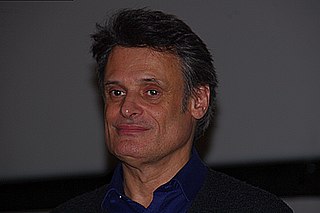
Charles de Meaux is a French film director and contemporary artist. His work combines fine arts and cinema.
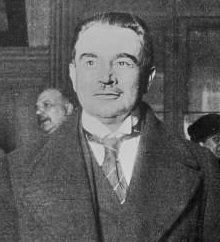
Jules Gaston Henri Carde was a French colonial administrator who served as Governor General of French West Africa and then Governor General of Algeria.

Pierre Anctil is a Canadian historian. He is specialist of the Jewish community of Montreal, of Yiddish literature and of the poetic work of Jacob-Isaac Segal. He also published on the history of immigration to Canada. He translated a dozen Yiddish books into French.

Fabienne Kanor is a French journalist, novelist and filmmaker of Martinique origin. She is a winner of the Prix Carbet de la Caraïbe et du Tout-Monde.

Mohamed Mbougar Sarr is a Senegalese writer. Raised in Diourbel, Senegal and later studying in France, Sarr is the author of four novels as well as a number of award-winning short stories. He won the 2021 Prix Goncourt for his novel The Most Secret Memory of Men, becoming the first Sub-Saharan African to do so.

Alain Gomis is a French-Senegalese film director and screenwriter. His 2017 film Félicité was selected as the Senegalese entry for the Best Foreign Language Film at the 90th Academy Awards, making the December shortlist.

Olivier Barlet is a French journalist, translator, film critic and researcher on African cinema and its diasporas.
